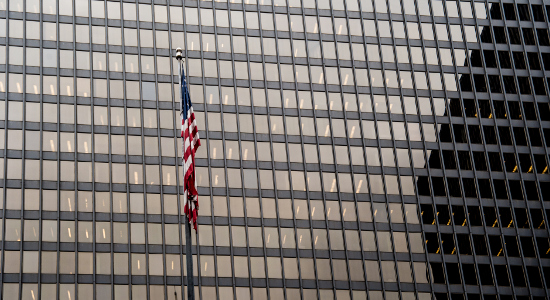
Oct. 9, 2017 – Two members of the local Tea Party in the Town of Campbell placed banners like “Honk to Impeach Obama” on a pedestrian overpass on Interstate 90. Recently, a federal appeals court upheld a town ordinance that banned such displays.
The ordinance banned all signs, flags, or banners on I-90 overpasses in the town, or within 100 feet on either side of an overpass. The ordinance was the town’s response to public displays hung by Gregory Luce and Nicholas Newman, local Tea Party members.
In Newman v. Town of Campbell, No. 15-2627 (Sep. 22, 2017) a three-judge panel for the U.S. Court of Appeals for the Seventh Circuit upheld the ordinance as-applied to the town’s overpasses, but not the 100-foot restriction on either side of an overpass.
The panel ruled that traffic safety was a sufficient enough reason to burden free speech rights, and the town was not required to provide empirical evidence of the safety risks created by political banners or other signs displayed on highway overpasses.
“It does not take a double-blind empirical study, or a linear regression analysis, to know that the presence of overhead signs and banners is bound to cause some drivers to slow down in order to read the sign before passing it,” Judge Frank Easterbrook wrote.
“When one car slows suddenly, another may hit it unless the drivers of the following cars are alert – and, alas, not all drivers are alert all the time.”
The panel also noted that the town’s ordinance is a time, place, and manner limit that applies to everyone. Thus, it is not a content-based restriction on one group only.
Luce and Newman had argued that time, place, and manner regulations require empirical support and the only evidence of safety concerns presented to the town’s board was provided by the town’s police chief, who had an ax to grind with them.
After the ordinance passed, the police began enforcement. In response, videos of police enforcement appeared on the internet, including police removal of an American flag that was unfurled on the overpass. Comments to videos indicated Tea Party involvement.
Kelemen, admittedly, decided to strike back. He tied Luce’s name and email address to gay pornography sites and posted comments to the local newspaper’s website, claiming Luce did not pay property taxes or other debts and that his car would be repossessed.
Kelemen signed online comments as “Bill O’Reilly” but when his true identity became known, Kelemen resigned as police chief and later pleaded no contest to a state law charge of unlawful use of a computerized communication system.
The district judge ruled that a state law remedy was appropriate, rather than 42 U.S.C. § 1983, because Kelemen underwent the defamation campaign in a private capacity, not in his official capacity as police chief acting under color of state law.
However, the appeals panel noted that Kelemen pressed the ordinance and provided the information to the town’s board concerning the dangers of allowing banners on overpasses. His misconduct indicated that Kelemen could not be a credible source.
“Given Kelemen’s misconduct, it is not possible (when acting on a motion for summary judgment) to accept his statements as truthful, even though there was no directly opposing evidence,” Judge Easterbrook wrote.
This gave plaintiffs an opening, Easterbrook noted, but it did not mean resolution of the case in their favor. The panel noted that regardless of Kelemen’s credibility, the ordinance was not required to be supported by empirical evidence about driving safety.
The U.S. Supreme Court has “never suggested that empirical support is required for all time, place, and manner limits,” Judge Easterbrook wrote.
“It is enough to say that a state or local legislature that attempts to reduce the incidence of sudden braking on a superhighway cannot be thought to be acting irrationally or trying to suppress speech for no good reason,” Easterbrook explained.
However, the panel noted that this same rationale did not apply to the portion of the overpass rule that prohibited signs within 100 feet on either side of the overpass. This would include a “for sale” sign in the yard of a homeowner within the 100-foot zone.
“Time, place, and manner restrictions must serve a ‘significant governmental interest’ and be no more extensive than necessary,” Easterbrook noted. “It is hard to see why signs off the highway, and too small to cause drivers to react, should be banned.”
